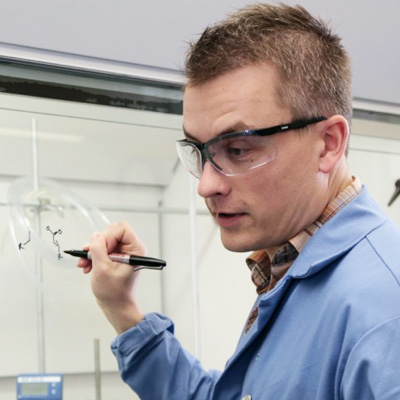Creating new chemical reactions that have incredible applications
Plants are some of the most remarkable and important organisms on the planet for a single reason: photosynthesis. Through the uptake of carbon dioxide and with a bit of sunlight and the right catalysts, they make the carbohydrates and oxygen necessary for life on the planet. Inspired by the fantastic engineering of Mother Nature, Dr. David Nicewicz of the University of North Carolina at Chapel Hill, hopes to create new chemical reactions that produce the chemicals and materials that are indispensable to modern life in a more environmentally conscious and cost-effective manner. Dr. Nicewicz develops simple organic dyes that are able to harvest sunlight and convert it to chemical energy to catalyze completely new chemical reactions, in much the same way plant life does. In contrast to researchers that work to capture energy created by the sun, Dr. Nicewicz's research team creates dyes that simply aid the process of moving electrons between two otherwise inert reactants, to facilitate completely new chemical processes.
Dr. Nicewicz's research has the ability to transform the way in which scientists make a great deal of important chemicals that are used on a range of scales, from large scale commodity chemicals to pharmaceuticals, to materials. The new chemical transformations Dr. Nicewicz's laboratory has developed are already being used in drug discovery processes in pharmaceuticals, and many other potential applications are possible. Incredibly, Dr. Nicewicz is able to accomplish all of these processes using purely organic catalyst systems which have the potential benefit of lower costs to consumers and more environmentally friendly products. Dr. Nicewicz's group is one of just a handful that are working in this area known as photoredox catalysis. His work to create new chemical reactions may one day allow biomedical researchers to rapidly develop libraries of compounds in order to quickly develop new drugs and things that could ultimately have applications in a number of areas including healthcare, biodegradable plastics, and large scale chemical synthesis.
Current research includes:
-
Libraries of Bioactive Compounds: Dr. Nicewicz is looking at new ways to ultimately take existing drug scaffolds, drugs or drug-like molecules, and use the reaction technology to rapidly make libraries of compounds that are unique to screen for potential bioactivity. Therefore, his research will allow for the development of new organic synthesis tools for biomedical researchers which will allow them to rapidly discover therapeutics.
-
Innovative Methods: Dr. Nicewicz is developing novel ways of making things like chemical solvents and fragrances that we use in products found in everyday items. He hopes to develop more efficient and environmentally friendly ways of making products like paints, adhesives, and plastics. His research has the potential to affect even individual consumers as it will bring down the costs for many materials we use each day in addition to advancing sustainability and efficiency.
- New Polymerization Strategies: Dr. Nicewicz is developing new polymerization strategies to make novel materials. By using organic dyes as catalysts, Dr. Nicewicz's group will develop novel polymers with potential applications in devices that consumers use each day and could help improve biomedical devices while continuing to be more cost effective and environmentally conscious.
Bio
Dr. Nicewicz was born and raised in central New Jersey. He completed his B.S. (2000) and M.S. (2001) in Chemistry at the University of North Carolina at Charlotte under the direction of Craig Ogle. Dr. Nicewicz then went on to the University of North Carolina at Chapel Hill, where he did his Ph.D. studies under the tutelage of Jeffrey Johnson. Under Dr. Johnson's direction, he investigated the use of the Brook rearrangement in synthetic methodology and its application to the total synthesis of zaragozic acid C. Upon completion of his Ph.D. studies in 2006, Dr. Nicewicz returned to his native New Jersey where he was a Ruth L. Kirschstein National Institutes of Health Postdoctoral Researcher in the laboratories of Professor David MacMillan at Princeton University. While in Dr. MacMillan's lab, he helped develop the budding area of photoredox organocatalysis. In July of 2009, Dr. Nicewicz returned to University of North Carolina at Chapel Hill as an Assistant Professor of Chemistry.
Since he was young Dr. Nicewicz has enjoyed science. He has always been a curious person and loves to learn how things work in this amazing universe that we inhabit. At the same time, he has always tinkered with the latest technology to make it even better. Ultimately, he would love to make a contribution to chemistry that would have a lasting, positive impact on our society. As a researcher truly passionate about using plants to create helpful scientific strides, in his free time, Dr. Nicewicz enjoys gardening. He maintains both terrestrial and aquatic plants and even has a freshwater aquarium that demonstrates photosynthesis taking place live. In addition, he finds balance to the rigors of research and teaching by finding outlets in travel, tennis and the culinary arts.
Website: http://www.chem.unc.edu/people/faculty/nicewicz/group/


